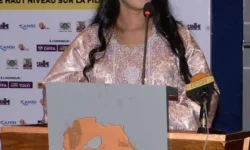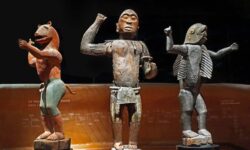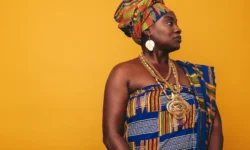In Paris, the capital of France, the United Nations Educational, Scientific and Cultural Organization (UNESCO) decided to accredit 3 Turkish non-governmental organizations (NGOs) to UNESCO’s Intangible Cultural Heritage (SOKÜM) Secretariat with an advisory role.
The 10th UNESCO Intangible Cultural Heritage General Assembly was held in Paris. Among the participants were Selim Terzi, Director General for Living Heritage and Cultural Activities of the Ministry of Culture and Tourism, Ambassador Prof. Dr. Gülnur Aybet, Permanent Representative of Turkey to UNESCO, and Prof. Dr. Öcal Oğuz, President of the Turkish National Commission for UNESCO.
The accreditations of Bursa UNESCO Association, Women and Democracy Foundation (KADEM) and International Mevlana Foundation to UNESCO were accepted at the General Assembly.
In a statement to AA correspondent, Ambassador Aybet emphasized that UNESCO’s Convention on the Protection of the World Cultural and Natural Heritage is of great importance in terms of protecting the intangible heritage of humanity and transferring it to future generations.
Noting that Turkey has made a significant contribution to the implementation of this convention, Aybet said that Turkey has 30 items registered in UNESCO’s Intangible Cultural Heritage (SOKÜM) lists, 13 of which are multinational files.
Aybet said, “This shows how much we cooperate with countries close to our culture. The fact that we have multinational files also shows the importance we attach to international cooperation and solidarity. In this process, we support our non-governmental organizations to be accredited to the SOKÜM secretariat with an advisory role.”
Reminding that there are already Turkish NGOs accredited to UNESCO and that a decision was taken at this General Assembly to accredit 3 additional Turkish organizations, Aybet said, “I congratulate our new NGOs KADEM, International Mevlana Association and Bursa UNESCO Association, which are accredited to SOKÜM (Intangible Cultural Heritage).”
Noting that Turkey attaches great importance to the protection of intangible culture, especially in countries facing war and crisis situations around the world, Aybet said, “In this context, we drew attention to the humanitarian crisis in Gaza and called on UNESCO to take action and take measures in this regard.”
Ambassador Aybet pointed out that NGOs play an important role in transferring intangible cultural heritage to future generations.
“It is important that our NGOs are accredited at UNESCO”
Selim Terzi, Director General of Living Heritage and Cultural Activities at the Ministry of Culture and Tourism, said, “For us, of course, the accreditation of non-governmental organizations at UNESCO is very important and very valuable.”
Noting that Turkey is one of the countries that have played a very serious role in the establishment process of UNESCO within the scope of both the value produced by humanity and the protection of cultural heritage, Terzi made the following assessment:
“In this sense, we have a lot of elements especially in Turkey. We have 1142 elements in the national inventory, and until 2023, we have accredited 30 (intangible cultural) elements, 13 of which are multinational files, to UNESCO lists. We rank second in the world in this sense. Of course, the role of non-governmental organizations is very important in these efforts.”
Terzi stated that they expressed their views at the two-day General Assembly at UNESCO headquarters in Paris and underlined that they attach great importance to the accreditation of Turkish NGOs to UNESCO.
Selim Terzi said, “When we return after today, we will continue to inform our civil society organizations in Turkey in this sense. Because we know that the more non-governmental organizations are involved in this process, the stronger our future will be in the eyes of UNESCO. In this sense, I hope we will always do good work.”
Terzi emphasized that Turkey has a very ancient geography and that there are very serious cultural elements in every city of the country that can be added to the UNESCO World Heritage List, and said, “Hopefully, we will be at a better point with both our individual files and multinational files in the coming processes.”
Noting that Turkish NGOs accredited to UNESCO will have the opportunity to better promote their work to the international public, Terzi said that NGOs can participate in and contribute to UNESCO work.
Terzi said, “I attach great importance to the fact that our elements in Turkey’s ancient geography, our intangible cultural heritage are more known and more visible in the world.”

















